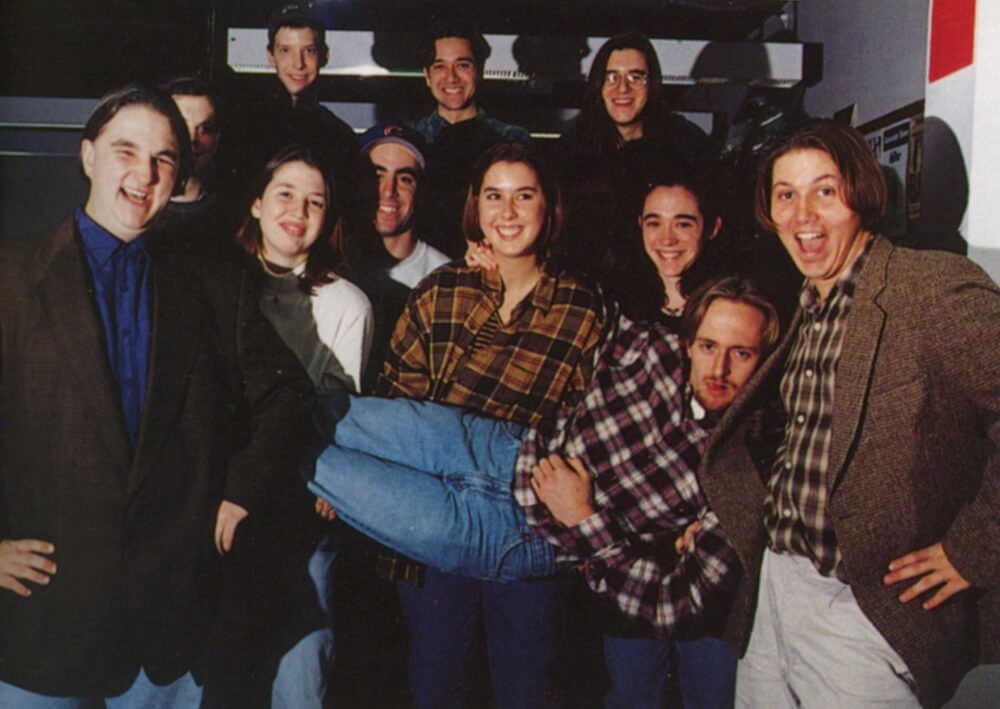Dead-on
 Will Leitch (image by David Friedman)
Will Leitch (image by David Friedman) Less than two hours after shooing his parents out of the residence hall parking lot, Will Leitch ’97 MEDIA, already aware that he wanted to become a professional writer, moseyed into the offices of The Daily Illini and volunteered to work on the newspaper. Asked what his interests were, the University of Illinois freshman mentioned movies and sports, and the next day he was assigned to write an article about an intramural basketball game and to review a film. That was in 1993. Now, not 20 years later, Leitch, 36, is one of the most popular, widely read, in-demand sportswriters in the country and a film reviewer for Gawker.com. Insightful, witty and gifted with a breezy writing style, he is a mainstay at New York magazine and a valued contributor to GQ, The New York Times and other publications. Tempting as it may be to draw a straight line from the callow applicant of yesteryear to the polished professional of today, taking the shortest distance between two points seldom tells the most interesting story – or the most accurate. As with so many young writers, Leitch’s success did not come automatically, but after struggle. In his case, attaining a place in the mainstream media first meant becoming one of the breakout stars of the ragingly popular sports website Deadspin, where, as possibly the world’s first great postmodern sportswriter, he became a figure of adulation, scorn and controversy. As detours go, it was splendid.
“I had a pretty typical experience – YEAH!” says Leitch (pronounced “leech”), who is not cheerleading his own lines, but a layup by the Illini men’s basketball team, whose games he has religiously observed since his ladhood in Mattoon, a small town that lies approximately 48 miles on a straight drop south of the University. We are watching the game in the Downtown Bar & Grill in Brooklyn, not far from the leafy, brownstone-lined street where Leitch makes his home with his wife, Alexa, an interior decorator. (“She’s a fan of the Georgia Bulldogs, but in her wedding vows, she pledged to root for the St. Louis Cardinals. I didn’t force her to, but I’m holding her to it.”) Over several samples of local brews, Leitch, interrupting himself to cheer, moan and text his father who is at the game (“He got a seat behind the bench, although how I don’t know. We Leitches are upper-deck folks”), shares his version of the time-honored tale in which an aspiring neophyte invests several years of hard work before achieving overnight success.

Will Leitch, at far right, mugs along with other Daily Illini editors in a 1996 Illio photo. (Image courtesy of Illio)
Like many a hero of this kind of tale, Leitch made his way to New York City and for several years scuffled out a living, bumping from job to job, collecting enough clips to remain confident in his talent without ever quite managing to plant a second foot on the ladder of success, or for that matter, firmly securing one on the bottom rung. At one point, he spent a year answering phones in a doctor’s office, while continuing to write. “Quitting wasn’t an option for me,” says Leitch. “I knew if I left New York that it would be over for me.” After this phase of the experience, which usually culls the herd of the untalented and uncommitted, he emerged with more confidence, more connections and a good idea.
In 2003, along with several other young writers, Leitch started a site called The Black Table. He contributed a column called Life As A Loser, most famous for a first installment in which he tells the tale of being dumped by his fiancée hours before appearing as a contestant on the television game show “Win Ben Stein’s Money,” a comic predicament which Jimmy Kimmel, then Stein’s announcer, learned about and gleefully proceeded to bat about like a beach ball. (A sad tale, sure, but as any writer will tell you, love comes and goes, but a good, humiliating, faithless fiancée story is a joy forever.) “That experience was a turning point,” says Leitch. “I stopped thinking that I needed to get a job at an established place. I began to realize that if I wrote good stuff, people would find it.”
Which they did. In 2005, Leitch was approached by Lockhart Steele, the managing editor of Gawker Media. Gawker had at the time become a white-hot Internet company, housing several signature sites that covered media, politics and entertainment, all in ways that seemed to exploit the restlessness of the Internet reader rather than resist it. Steele invited Leitch to start a blog devoted to gambling but was refused. “I think gambling is bad,” says Leitch. “But I pushed him to do a sports site, a blog that would be a combination of gossip, humor, obsession – a place for people who want to talk about sports the way people really talk about sports.” Gawker eventually agreed to a trial run, and in September 2005, Deadspin debuted, with Will Leitch as the editor-in-chief (on a staff of two.)
“I knew this approach would work,” he says, stressing “knew” in the way people do when in fact they could not have possibly known anything but merely fervently believed in the face of great skepticism. “That was the summer when there was a story that [then Atlanta Falcons quarterback] Michael Vick was seeking medical treatment under the pseudonym of Ron Mexico. The particulars of Vick’s situation aside, the alias Ron Mexico was just hilarious. All of my friends were talking about and joking about it, and the mainstream publications were ignoring it. That’s when I knew there was an opening for us.”
The man and the moment met. Modern sports was built on the concept of greatness – let’s see what awe-inspiring feats and enduring accomplishments these moral and athletic paragons can perform for you this evening – and sports journalism has been the willing and handsomely rewarded handmaiden of that approach. But after years of selfishness and scandal knocked sports off its pedestal, the appetites of postmodern fans have morphed: They’re still interested in greatness, and in victory, but they also value entertainment. Fantasy baseball, Madden football, the explosion of fan gear – the fun could be had in a lot more places than the arena. And if politics and entertainment had already become targets of gossip and humor and deconstruction, how could sports remain immune? Leitch instinctively understood that the national sports audience that the leagues and the networks had so painstakingly constructed – an audience primarily comprising young men – wouldn’t mind a joke or two or 10. “If it made me laugh,” he says, “others would, too.”

Will Leitch shares a park bench in Brooklyn with an Illini gnome, though his top allegiance is to the St. Louis Cardinals. “Life is hard,” he has written. “Sports are where we go to hide.” (Image by David Friedman)
And so Leitch larded his posts and predictions with sarcastic asides about anemic hitters and incompetent managers, then mixed in items about odd fan promotions, scoreboard races, bizarre foreign sporting customs, sluggers who dye their moustaches, a reporter who resembled “a small Russian female doctor.” When video of an inebriated quarterback emerged, it emerged on Deadspin. When pictures of bullpen pitchers ogling female fans showed up, they showed up on Deadspin. When a studio analyst circulated a photo of his intimate anatomy among intimate friends, Deadspin gave the story a home. That was an instructive moment, and soon announcers were receiving as much attention from Deadspin as did athletes. “Covering what went on behind the scenes at ESPN was huge for us,” says Leitch. “Our readers spend so much time on that network, and they were like a frat house over there. People in [the ESPN broadcast studios] would leak memos, and gossip, and our readers ate it up.” Once again, welcome to Wide World of Postmodern Sports.
“The main thing for me,” says Leitch, “was that I always tried to be funny and to have fun. If I had been a Matt Drudge or a Perez Hilton, if I had had an agenda or was mean, then the blog wouldn’t have worked. It would have seemed unseemly, and sports fans don’t like to feel that way. Besides, I’m from Mattoon, man. I don’t want to feel dirty at the end of the day. I don’t want people saying, ‘Look at this scum bag.’ I love sports, and I wanted to convey the fun I have.” And so he did. For the next several years, Leitch wrote 18, 19, 20 posts a day. Deadspin was one of the most successful sites on the Internet, and almost single-handedly, Deadspin was the product of the tastes, opinions, whimsies and Weltanschauung of Will Leitch.
Which, in time, in some circles, rendered him Public Enemy No. 1. Or at least the Poster Boy, specifically the Wanted Poster Boy, responsible for the declining state of American intelligence and taste, not to mention the shrinking state of American print journalism. In April 2008, Leitch was asked to appear on a panel on the HBO television program “Costas Now,” hosted by eminent sportscaster Bob Costas, to discuss sports blogs. The other guests were Cleveland Browns wide receiver Braylon Edwards and the Pulitzer Prize-winning journalist Buzz Bissinger.
Bissinger was a man on a mission. After Leitch fielded a couple of softballs tossed by Costas to set up the discussion, Bissinger, scowling righteously, pounced. “I really think you’re full of [expletive],” he snarled at Leitch. “I think that blogs are dedicated to cruelty [and] to journalistic dishonesty.” And that was just the opening salvo. Bissinger continued to heap on the disdain, and Costas, in the role of the Not Much Better Cop, tried to get Leitch to confess to what the sportscaster termed “the reasonable criticism” of the blogs.
“I knew what was coming,” says Leitch. “I knew what Bissinger had said about blogs, and when I saw him backstage, clenching his papers tightly and looking very fired up, I could tell what was going to happen. It’s funny, but the night before, I spoke to my mom. I told her that I didn’t think Bissinger got what Deadspin was all about, or what I was trying to do, and that I was just being set up to be yelled at. And she said, ‘You need to be Obama-cool. No matter what happens, just smile, and let them be crazy.’ And I listened to her. By the time of the taping, Bissinger could have brought out a chain saw, and I would have said, ‘Sir, I may disagree with you, but you have a right to your chain saw.’”
Mom was right. Leitch calmly absorbed Bissinger’s onslaught, leaving the would-be crusader looking like the old man carping about how loudly those damn kids play that rock and roll. “I think they expected me to come out like [punk rocker] Sid Vicious and say, ‘Bollocks to your mainstream media,’ but I didn’t,” says Leitch. Costas, in wonderment, deigned Leitch “likable”; Bissinger, more grudgingly, likened him to Superman sidekick Jimmy Olsen “on Percocet.”
“The thing that bothered me most,” says Leitch, “is that it was clear that neither of them ever read Deadspin. They just wanted me there as a target. And I wasn’t even that good a target! If they had looked at The New York Times that Sunday, they would have seen an article by Buzz on one page and one by me facing it.”
Leitch left Deadspin later that year. One reason was that the site needed to change. As Leitch recently wrote in a post on the site, “It was only a matter of time until everyone else realized, ‘Oh, blogs aren’t so crazy after all,’ and went all Yankees and Red Sox on our Billy Beane [Oakland] A’s, taking our principles and putting more money behind them.” No longer is Deadspin a collection of Leitch’s daily observations; now a staff of 33 strives to break big stories for what has become a business- plan-affirmed, bean-counter-approved, search-engine-optimized website.
But there was another reason. “I was becoming more of a blog than a person,” says Leitch. “I couldn’t talk to anybody about anything but my blog anymore, and if I went out in public, the only thing anybody ever wanted to talk to me about was my blog, which was OK because it was the only thing I wanted to talk about. And it was too much. It was the first thing I thought about in the morning and the last thing at night, and it wasn’t just because I was being conscientious. It was because I was losing perspective. Believe it or not, it took a conversation with Mark Cuban, the owner of the Dallas Mavericks, to help me see. He told me that anybody who runs a blog starts to hang on every comment that readers make, which leads to an overinflated sense of his importance. And I came to agree with him.” (Leitch rejoined Gawker Media in February and contributes movie reviews co-authored with Tim Grierson.)
Two years later, it’s hard to argue with the decision. With a wife and son in Brooklyn, with family in Mattoon, with the Illini to root for and the St. Louis Cardinals set to defend their title, with a full schedule of assignments from New York and endless entreaties from editors elsewhere to do more articles and another book, Leitch seems to have in full blossom the life he began pursuing when he walked into the offices of The Daily Illini nearly two decades ago. “I try to say yes to everything,” he says, “because I’m sure that in two years it could all end.”
Possibly. But that wouldn’t be the way to bet.
Malanowski is the author of “And the War Came” and has been an editor at Spy, Time and Esquire magazines.

